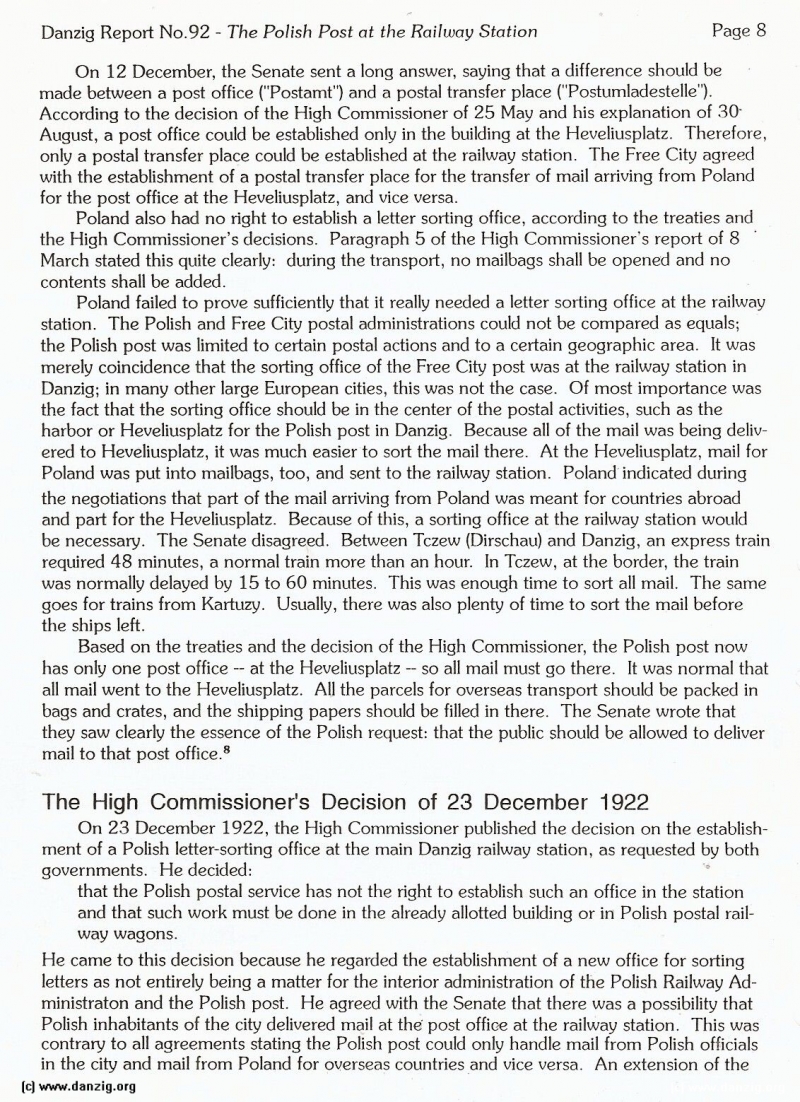
> The Polish Post office at the Railway Station in Danzig
On 12 December, the Senate sent a long answer, saying that a difference should be made between a post office (“Postamt”) and a postal transfer place (“Postumladestelle3. According to the decision of the High Commissioner of 25 May and his explanation of 30 August, a post office could be established only in the building at the Heveliusplatz. Therefore, only a postal transfer place could be established at the railway station. The Free City agreed with the establishment of a postal transfer place for the transfer of mail arriving from Poland for the post office at the Heveliusplatz, and vice versa.
Poland also had no right to establish a letter sorting office, according to the treaties and the High Commissioner’s decisions. Paragraph 5 of the High Commissioners report of 8 March stated this quite clearly: during the transport, no mailbags shall be opened and no contents shall be added.
Poland failed to prove sufficiently that it really needed a letter sorting office at the railway station. The Polish and Free City postal administrations could not be compared as equals; the Polish post was limited to certain postal actions and to a certain geographic area. It was merely coincidence that the sorting office of the Free City post was at the railway station in Danzig; in many other large European cities, this was not the case. Of most importance was the fact that the sorting office should be in the center of the postal activities, such as the harbor or Heveliusplatz for the Polish post in Danzig. Because all of the mail was being delivered to Heveliusplatz, it was much easier to sort the mail there. At the Heveliusplatz, mail for Poland was put into mailbags, too, and sent to the railway station. Poland indicated during the negotiations that part of the mail arriving from Poland was meant for countries abroad and part for the Heveliusplatz. Because of this, a sorting office at the railway station would be necessary. The Senate disagreed. Between Tczew (Dirschau) and Danzig, an express train required 48 minutes, a normal train more than an hour. In Tczew, at the border, the train was normally delayed by 15 to 60 minutes. This was enough time to sort all mail. The same goes for trains from Kartuzy. Usually, there was also plenty of time to sort the mail before the ships left.
Based on the treaties and the decision of the High Commissioner, the Polish post now has only one post office -- at the Heveliusplatz -- so all mail must go there. It was normal that all mail went to the Heveliusplatz. All the parcels for overseas transport should be packed in bags and crates, and the shipping papers should be filled in there. The Senate wrote that they saw clearly the essence of the Polish request: that the public should be allowed to deliver mail to that post office.8
The High Commissioner’s Decision of 23 December 1922
On 23 December 1922, the High Commissioner published the decision on the establishment of a Polish letter-sorting office at the main Danzig railway station, as requested by both governments. He decided: that the Polish postal service has not the right to establish such an office in the station and that such work must be done in the already allotted building or in Polish postal railway wagons.
He came to this decision because he regarded the establishment of a new office for sorting letters as riot entirely being a matter for the interior administration of the Polish Railway Administration and the Polish post. He agreed with the Senate that there was a possibility that Polish inhabitants of the city delivered mail at the post office at the railway station. This was contrary to all agreements stating the Polish post could only handle rTail from Polish officials in the city and mail from Poland for overseas countries and vice versa. An extension of the
Danzig Report Nr. 92 - July - August - September - 1996, Page 8.
Hits: 1923
Added: 14/07/2015
Copyright: 2024 Danzig.org

